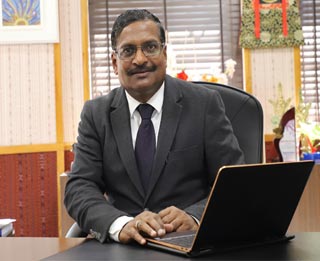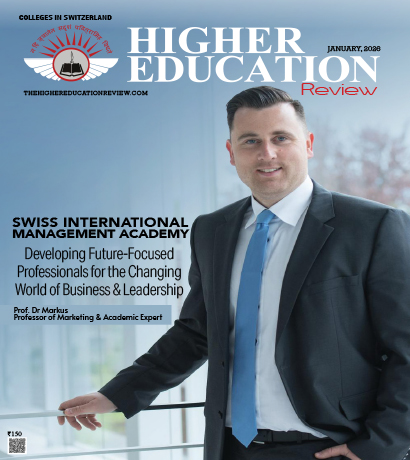NEP 2020: A Gateway For India To Enter The World Competition

Prof Mahadeo Jaiswal, Director IIM Sambalpur
Much has been said about the National Education Policy 2020 since it was passed by the Cabinet in the month of July. The Policy has been met with a flurry of reactions across the country. At a time when leading economies like Europe, US, South Korea, Japan are ageing, India holds the advantage of having an increased working population and the youngest in 2020. It not only offers an unprecedented edge over other developed or developing nations but also has the demographic potential offering ultimate superiority which could further contribute to the GDP growth rate and realise the dream of $5 trillion economy. With such latent talent lying dormant, it is indeed a need of the hour for amuch-needed structural reform in the education system of our great nation. The Policy has transformed the system to match international standards of pedagogy. The Policy aims to inculcate critical thinking and creativity among students and encourage innovation. It also focusses on the higher education scenario to enhance its quality standard and make India a global knowledge superpower. By promoting a beneficial learning environment, research and free communication between teachers and students, the NEP is all set the ball rolling in the right trajectory.
The Indian Institutes of Management have been one of the country’s prestigious establishments since their inception. IIMs were declared institutions of national importance by the Ministry of Human Resource Development (now renamed Education Ministry) after the passage of Indian Institutes of Management Act, 2017. IIMs have always provided education par excellence and produced responsible leaders with an entrepreneurial blend of mind. However, due to their small structures, despite having ample talent, they have been unable to figure in top 100 institutes of the world. This has always been our shortfall in emerging as an institute of global repute. The new National Education Policy aims to change this by allowing technical institutes like IIMs become multi-disciplinary.
By becoming multi-disciplinary, IIMs will be able to introduce newer departments and newer courses which were never there before. This is in tandem with the international system of education. Most institutes abroad allow students to pursue various subjects within the same campus. It helps increase intellectual outcome. However, focus should lay more on integrating departments than just creating them for holistic learning. For instance, interconnecting science with arts, medicine with engineering will help students make the most of this multi-disciplinary approach. This step will also allow IIMs to become bigger in size and admit a greater number of students. This will facilitate our entry into the world competition. It will help us to compete with the elite institutes of the world and become at par with them in the coming years. This will also help attract foreign students to India and help the economy of the country as well.
“By promoting a beneficial learning environment, research and free communication between teachers and students, the NEP is all set the ball rolling in the right trajectory.”
The NEP 2020 also lays focus on research and its importance. This was previously lacking in our system, but it is crucial to have quality research data to enhance the richness of the quality of education. The deeper meaning of research in India must shift from programme to aptitude and that research as aptitude should be made a part of learning from primary education itself. In order to compete in the global space, research has to be promoted and motivated. We must make ample us of the talent we have in this country. Research will also help better the economic growth. Another objective of the NEP 2020 is to increase the Gross Enrolment Ratio or GER in higher education to 50 percent by 2035. The online system of education can also be utilised to reach this target, especially in catering to the female students or those who do not have physical access to educational institutions.
NEP has laid great emphasis on learning. Our method should shift from teaching to learning where teachers go into the class not to teach but to create new knowledge and learn. Ultimately if we want to be a global player, we need to move on to a new level called Creation. We need to create new accounting and measurement methods in the country and create our own cases. Method, Model, and Mode – the 3 Ms of learning, are critical to bringing NEP into action. The focus should be on creating new knowledge, and information and understanding should change to application and creation. We must look at creating our cases and follow a blended method of teaching where students, teachers, and industry can work together inside the class and learn better.
To achieve the vision of our Hon’ble Prime Minister of creating a 5 trillion-dollar economy, we must realize that it cannot be created by 50 companies alone. But if 1 million SME can create 1-100 million dollars each, they can create more than 5 trillion-dollar economy. Every household and every village should create businesses and that is the model of education we must foster as educationists. Each and every IIM of the country should foster an entrepreneurial mindset not only in their students but the community they belong in. This will be also help in ensuring and realising the dream of Aatmanirbhar Bharat.
The Indian Institutes of Management have been one of the country’s prestigious establishments since their inception. IIMs were declared institutions of national importance by the Ministry of Human Resource Development (now renamed Education Ministry) after the passage of Indian Institutes of Management Act, 2017. IIMs have always provided education par excellence and produced responsible leaders with an entrepreneurial blend of mind. However, due to their small structures, despite having ample talent, they have been unable to figure in top 100 institutes of the world. This has always been our shortfall in emerging as an institute of global repute. The new National Education Policy aims to change this by allowing technical institutes like IIMs become multi-disciplinary.
By becoming multi-disciplinary, IIMs will be able to introduce newer departments and newer courses which were never there before. This is in tandem with the international system of education. Most institutes abroad allow students to pursue various subjects within the same campus. It helps increase intellectual outcome. However, focus should lay more on integrating departments than just creating them for holistic learning. For instance, interconnecting science with arts, medicine with engineering will help students make the most of this multi-disciplinary approach. This step will also allow IIMs to become bigger in size and admit a greater number of students. This will facilitate our entry into the world competition. It will help us to compete with the elite institutes of the world and become at par with them in the coming years. This will also help attract foreign students to India and help the economy of the country as well.
“By promoting a beneficial learning environment, research and free communication between teachers and students, the NEP is all set the ball rolling in the right trajectory.”
The NEP 2020 also lays focus on research and its importance. This was previously lacking in our system, but it is crucial to have quality research data to enhance the richness of the quality of education. The deeper meaning of research in India must shift from programme to aptitude and that research as aptitude should be made a part of learning from primary education itself. In order to compete in the global space, research has to be promoted and motivated. We must make ample us of the talent we have in this country. Research will also help better the economic growth. Another objective of the NEP 2020 is to increase the Gross Enrolment Ratio or GER in higher education to 50 percent by 2035. The online system of education can also be utilised to reach this target, especially in catering to the female students or those who do not have physical access to educational institutions.
NEP has laid great emphasis on learning. Our method should shift from teaching to learning where teachers go into the class not to teach but to create new knowledge and learn. Ultimately if we want to be a global player, we need to move on to a new level called Creation. We need to create new accounting and measurement methods in the country and create our own cases. Method, Model, and Mode – the 3 Ms of learning, are critical to bringing NEP into action. The focus should be on creating new knowledge, and information and understanding should change to application and creation. We must look at creating our cases and follow a blended method of teaching where students, teachers, and industry can work together inside the class and learn better.
To achieve the vision of our Hon’ble Prime Minister of creating a 5 trillion-dollar economy, we must realize that it cannot be created by 50 companies alone. But if 1 million SME can create 1-100 million dollars each, they can create more than 5 trillion-dollar economy. Every household and every village should create businesses and that is the model of education we must foster as educationists. Each and every IIM of the country should foster an entrepreneurial mindset not only in their students but the community they belong in. This will be also help in ensuring and realising the dream of Aatmanirbhar Bharat.

